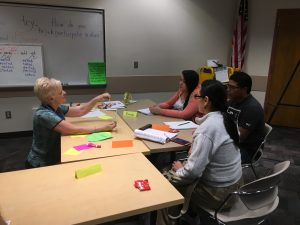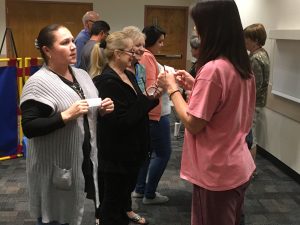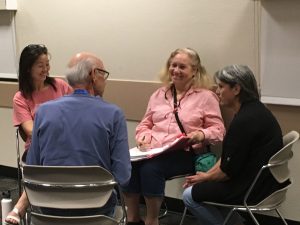The COVID-19 pandemic has put libraries nationwide in uncharted territory. We miss our customers, we miss interacting with them, and we miss hosting programs that educate and inspire.
We've created this blog series, Stories from Before, chronicling the stories of customers who ♥ all the Library offers, be it Storytime or Summer Reading, Books By Mail, English Language Classes, and much more. We hope these uplifting stories can help us all get through these challenging times and think about a brighter future.
Irregular verbs, the tricky ones!: Students tackle even the most complex parts of speech at English Language Classes
“Welcome everyone!” Mary Zimmerman, a Literacy Connects volunteer, enthusiastically greets the group of students at the Joyner-Green Valley Library’s weekly Beginning English Language class.
She begins by asking the students how they practiced over the past week.
Wang Jun, a student from China, immediately raises her hand, “I study English one hour in afternoon, one hour in evening.” Mary replies, “And it’s paying off, Wang Jun. Your English is improving!” Wang Jun beams, “Really? Thank you!”
Mary walks around the room speaking to the students with kindness and unbridled enthusiasm. Students Linna, Melva, Tere, Claudio, Sara, Xiomara, Jesus, and Brenda are eager to share how they practiced.
“I spoke to my grandchildren,” says Melva, while Linna explains how she was able to communicate clearly at garage sales. Mary congratulates everyone, telling them, “Every little bit helps. Every little bit is a step forward.”
Next, they play a game with Skittles. Color-coded questions are written across the whiteboard and students pick a Skittle and then answer the corresponding question. Sara pulls a green one and reads, “What do you like to eat?” She answers, “I like to eat carne asada.” A fellow student, Claudio, smiles and says, “La carnívora!” The classroom is warm, friendly, and safe—everyone chuckles at his friendly retort. Wang Jun’s question (an orange Skittle) is “What do you like to do?” She replies, “I like to eat,” and pops the candy in her mouth.
Following the game, they break into small groups. The focus this week is verbs, regular and irregular— “the tricky ones,” Mary jokes. John, another volunteer, is working with Xiomara, who is asked to make sentences about the two drawings in her hand. She nails the first one, which includes a regular verb. When she gets to the second one—an irregular verb—she hands it back to John and says, “No thank you, not this one,” and laughs heartily. She takes it from him and gets it on the first try.
Sara’s card shows a person closing a door. John asks, “Sara, did you close the door?” She smiles and says, “My house? Maybe!” Mary pops over and remarks, “Let’s hope so!”
On the other side of the Library, Diane, a third volunteer, is working with the Advanced English Language class. Graciela, Yolanda, Luis, Libe, Yinan, and Adrian sit around a table enjoying friendly conversation, something they say is key to their success.
Graciela says, “What we need most is practice with pronunciation. We practice together.” She continues, “I used to be afraid of making mistakes and that people would laugh at me when I was outside of this class. I’m not afraid anymore.”
Libe is from Italy and has been attending for three months. He says, “Learning English is an opportunity. When I first came, I could hardly speak any English. Now I can talk to people at the pharmacy, grocery store, and the bank. I even started taking Citizenship Classes at the Library.”
This is the second class Yinan has attended, and she’s already making great progress. One thing she hopes to learn is using the right words in different contexts. She tells the class a story. “I live with an older woman and once I told someone, ‘I live with old lady.’ It’s true, but maybe not the best way to say it.”
The class wraps up but the students stay, talking to one another until the Library closes for the evening. As Mary says, “every bit is a little step forward. These students are making huge strides."
“The rewards of teaching this class are many: friendships, love of learning, confidence-building, and perhaps even life-changing.” – Mary Zimmerman, Literacy Connects volunteer




